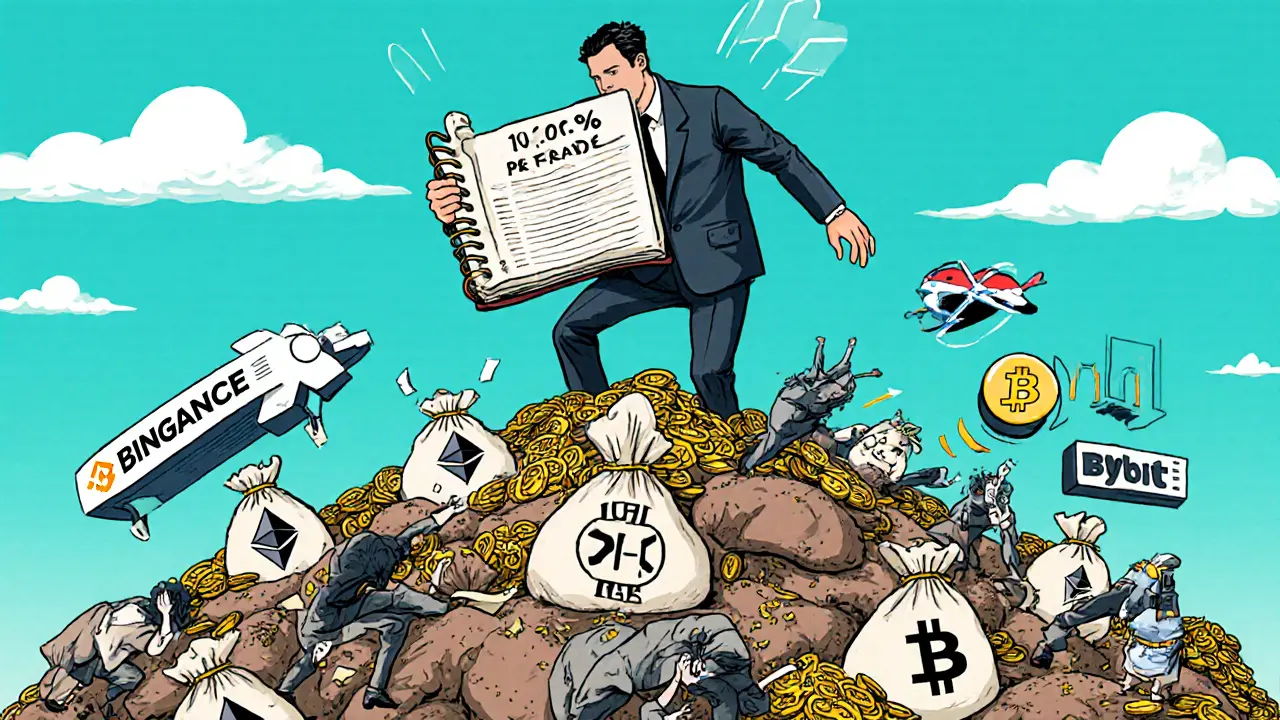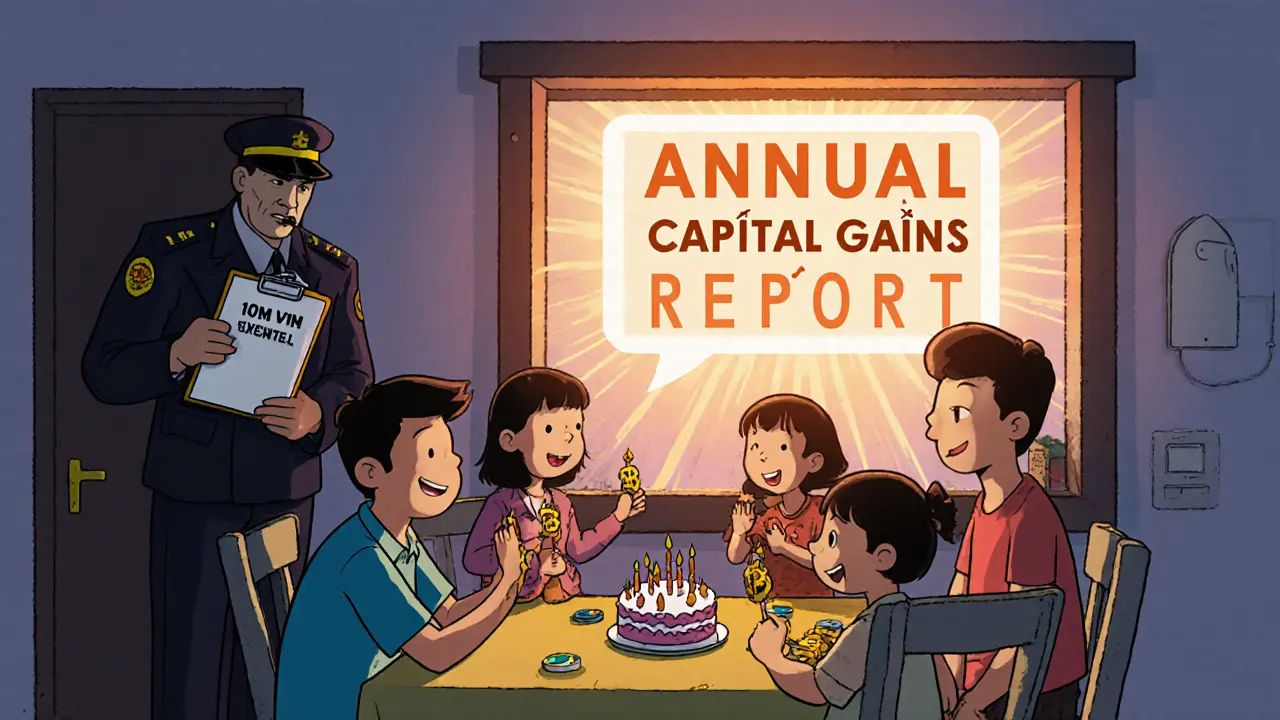Vietnam Crypto Tax Calculator
Calculate Your Vietnam Crypto Tax
See exactly how Vietnam's 0.1% transaction tax applies to your trades and potential capital gains.
For active traders: $100,000 annual trades = $100 in transaction tax alone. Stay under 10 million VND ($400) annual profit to avoid capital gains tax.
On January 1, 2026, Vietnam will begin taxing every single crypto trade at 0.1% - no exceptions. This isn’t a future idea. It’s law. And it’s already changing how people buy, sell, and hold Bitcoin, Ethereum, and other digital assets in one of the world’s most active crypto markets.
Think about that for a second. Every time you trade $1,000 worth of Bitcoin, you pay $1 in tax. Not on your profit. Not on your gain. Just on the total value of the trade. Even if you break even. Even if you lose money. The tax still applies. This is the core of Vietnam’s new approach to crypto taxation - and it’s unlike anything seen in most other countries.
Why Vietnam Is Doing This
Vietnam isn’t trying to shut down crypto. It’s trying to capture its value. With over 17 million people owning digital assets - that’s nearly one in five adults - the government sees a massive untapped revenue stream. Chainalysis data shows Vietnam ranks third globally in usage of international crypto exchanges. The total market value of crypto held by Vietnamese citizens exceeds $100 billion. That’s not small change.
The Ministry of Finance didn’t just pull this number out of thin air. They modeled it after the existing 0.1% tax on stock trades, which has been in place for years. By treating crypto like stocks, they’re signaling: digital assets are financial instruments, not just speculative bets. This is part of a broader rewrite of Vietnam’s tax code under the Digital Technology Industry Law, passed in June 2025 and set to take full effect in 2026.
The goal? Bring crypto into the formal economy. No more hidden income. No more cash-only trades. No more tax evasion through anonymous wallets. The government wants visibility - and they’re building the systems to get it.
How the Tax Actually Works
The 0.1% tax applies to every transfer of crypto assets - whether you’re swapping Bitcoin for Ethereum, selling Dogecoin for Vietnamese dong, or buying an NFT with USDT. It doesn’t matter if you’re holding long-term or day-trading. Every transaction triggers the tax.
Here’s what else you need to know:
- Who pays? Individuals and businesses. If you trade, you owe the tax.
- When is it collected? At the point of trade. Exchanges are required to withhold and remit the tax automatically.
- What’s taxed? Gross transaction value. Not profit. Not net gain. The full amount you’re trading.
- What’s exempt? The first 10 million VND (about $400) in annual capital gains. So if you make $300 in profit from crypto this year, you pay nothing.
But here’s the catch: the 0.1% tax is just one piece. Other taxes stack on top:
- 20% capital gains tax on profits when you cash out to fiat currency
- 5% to 35% personal income tax on mining, staking, and airdrops
- 20% corporate income tax for crypto businesses
- 10% VAT on exchange service fees
So if you buy Bitcoin for $10,000, sell it for $12,000, and then cash out - you’ve paid 0.1% on the sale ($12), plus 20% on the $2,000 profit ($400). That’s $412 total in taxes on a $2,000 gain. That’s a 20.6% effective tax rate on your profit - and that’s before any other fees.
Why Exchanges Are Worried
Major platforms like Binance and Bybit aren’t staying quiet. On October 1, 2025, Binance sent a formal letter to Vietnam’s Ministry of Finance warning that the 0.1% tax could cripple market liquidity.
Why? Because market makers - the traders who keep prices stable by constantly buying and selling - operate on margins as low as 0.01% per trade. A 0.1% tax is ten times their profit. If they can’t make money, they leave. And when market makers leave, spreads widen. That means you pay more to buy and get less when you sell.
Analysts from Singapore and South Korea, where similar taxes were tried, saw spreads increase by 30-50% after gross-value taxes kicked in. Retail traders suffered most. Prices became unpredictable. Volume dropped. The market became less efficient.
Vietnam’s exchanges now face a choice: absorb the cost (and lose money), pass it to users (and drive them away), or reduce trading activity (and hurt the market). None of these are good options.

What This Means for You
If you’re a casual holder who buys Bitcoin once a year and holds it for five years, this won’t hurt you much. You’ll pay the 0.1% when you sell, and the 20% capital gains tax - but you’re probably not trading often enough to feel it.
But if you’re an active trader - even someone who does 5-10 trades a week - this changes everything.
Let’s say you trade $500 worth of crypto every day. That’s $182,500 a year. At 0.1%, that’s $182.50 in transaction taxes alone. Add in capital gains tax on profits, and you’re paying hundreds in taxes just to move money around. That’s not a fee. That’s a barrier.
Some traders may shift to peer-to-peer (P2P) platforms to avoid the tax. But those platforms aren’t regulated. You lose protections. You risk scams. And if the government cracks down on unreported income, you could face fines starting at 2 million VND ($80) or 2% of unpaid taxes.
Reporting is mandatory. You must file your crypto earnings with the General Department of Taxation by March 31 each year. Businesses file quarterly. The system is being built to match bank-level compliance. Your wallet address will be linked to your ID. Anonymity is gone.
What’s Next? The Pilot Program
Don’t expect the full system to roll out on January 1, 2026, like flipping a switch. The Ministry of Finance is launching a pilot program - small-scale, closely watched, with limited exchanges and users. This is their safety net.
The pilot will test:
- Can exchanges handle the tax withholding without system crashes?
- Does the tax reduce trading volume too much?
- Are people moving to offshore platforms?
- Can the tax be collected accurately across different wallets and tokens?
Based on the results, the government may adjust. There are already rumors of possible relief measures: a 10% corporate tax break for exchanges in their first five years, or even a VAT exemption on crypto trades to boost liquidity. But nothing is confirmed.
The bigger picture? Vietnam wants to be a regional crypto hub. But they also want to tax it. That’s the tightrope they’re walking.

How to Stay Compliant
If you’re trading crypto in Vietnam, here’s what you need to do now:
- Keep detailed records of every transaction - date, asset, amount, value in VND, and platform.
- Use only licensed exchanges. They’ll handle the 0.1% tax automatically.
- Track your annual capital gains. Stay under 10 million VND ($400) to avoid the 20% tax.
- File your annual report by March 31. Use the General Department of Taxation’s online portal.
- Don’t use unregulated P2P platforms as a tax loophole. They’re risky, and the government is tracking them.
There’s no grace period. No amnesty. The clock starts January 1, 2026. If you’ve been trading since 2024, you’re already liable for past gains. The government has tools to trace on-chain activity. Ignorance won’t protect you.
Will This Work?
Projections say Vietnam could collect over $800 million a year from this tax. That’s a huge win for the budget. But it’s not guaranteed.
History shows that heavy crypto taxes often backfire. South Korea’s 20% capital gains tax led to a 60% drop in domestic trading volume. India’s 30% tax on crypto gains drove many users to offshore exchanges. Vietnam’s 0.1% tax is lower, but it’s applied to every single trade - not just profits. That’s the real danger.
If trading volume drops by 30% because traders flee to Singapore, Thailand, or the UAE, then the government collects less - and loses the chance to build a thriving digital finance sector.
The real question isn’t whether the tax will generate revenue. It’s whether it will kill the market it’s trying to regulate.

8 Comments
This is a landmark moment for crypto regulation in Southeast Asia
Vietnam is not just taxing crypto
They are formally recognizing it as a financial instrument
The 0.1% gross transaction tax mirrors their stock market model
It’s elegant in its simplicity
No need to track profits
No need for complex accounting
Just tax the movement
That’s governance with clarity
Market makers will struggle
But that’s the cost of integration
The real win is bringing $100 billion into the formal economy
Transparency over anonymity
This is how nations evolve
Other countries will watch closely
this tax is a joke lmao 0.1% sounds small until you realize you pay it every time you swap usdt for btc or doge or whatever dumb coin you're chasing. they think they're smart but they're just killing liquidity. good luck with that.
Actually this is very good move by Vietnam government
India also think like this
But we have 30% tax on profit
Vietnam is smarter
They tax every trade not only profit
So even if you lose money you still pay
This stop people do fake trading to avoid tax
Also exchange must collect tax automatically
Very clean system
Not like India where everyone lie on their tax return
Vietnam is rising
0.1% on every trade is a death sentence for day traders and market makers. no one will trade if they have to pay 20 cents every time they buy 200 dollars of eth. the market will turn into a graveyard. this isn't regulation this is sabotage
Let’s be honest - this isn’t about revenue
It’s about control
Every wallet linked to your ID
Every transaction tracked
They’re not just taxing crypto
They’re building a surveillance state
And they call it ‘formal economy’
What’s next
Blockchain analytics firms hired by the ministry
AI algorithms flagging ‘suspicious’ whale movements
They’re not regulating finance
They’re weaponizing compliance
And you’re all applauding
I’m not a trader but I’ve held btc since 2021. This doesn’t affect me much. I’ll pay the 0.1% when I cash out and the 20% on profit. I’m fine with that. At least it’s clear. I respect that they’re trying to bring order. It’s a step forward.
There’s poetry in this
They’re not trying to kill the wild beast
They’re trying to domesticate it
Every transaction - a heartbeat
Every tax - a pulse
The market was a shadow economy
Now it’s under the sun
Yes, liquidity will bleed
Yes, traders will flee
But the soul of this system is honesty
Not anonymity
Not chaos
Not the myth of ‘free markets’ that never existed
This is the quiet revolution
Not with guns or protests
But with a decimal point
bro this is sooo cringe 😭 why tf would u tax every trade like that?? imagine u swap btc to eth then back to btc in 10 mins 😭💸 u just paid 0.2% for NOTHING. vietnam is trying to be singapore but they dont even have the infrastructure 😅 they gonna lose all the traders. i’m moving to thailand 🇹🇭